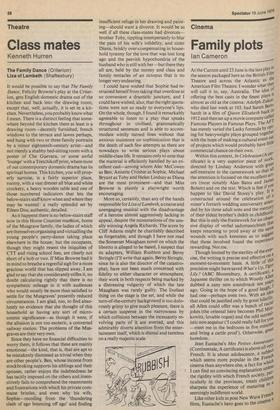Theatre
Class mates
Kenneth Hurren
The Family Dance (Criterion) Liza of Lambeth (Shaftesbury) It would be possible to say that The Family Dance, Felicity Browne's play at the Criterion, gets English domestic drama out of the kitchen and back into the drawing room, except that, well, actually, it is set in a kitchen. Nevertheless, you probably know what I mean. There is a distinct feeling that somewhere beyond the kitchen there at least is a drawing room—decently furnished, french windows to the terrace and lawns perhaps, and hung with two or three family portraits by a minor eighteenth-century artist—and not merely a shabby bed-sitting room with a poster of Che Guevara, or some awful 'lounge' with a Tretchikoff print, where most of our contemporary domestic drama has its spiritual homes. This kitchen, you will properly surmise, is a fairly superior place, roomy, with a vast dresser all blue and white crockery, a heavy wooden table and one of those numbered indicators that lets the below-stairs staff know when and where they may be wanted : a really splendid set by Eileen Diss, authentic, detailed.
As it happens there is no below-stairs staff now in this Home Counties maition, home of the Musgrave family, the ladies of which are themselves organising and victualling the young people's party-dance taking place elsewhere in the house; but the occupants, though they might resent the iniquities of CTT and rising school fees, are clearly not short of a bob or two. If Miss Browne had it in mind to breathe a regretful sigh for a more gracious world that has slipped away, I am glad to say that she considerately stifles it, no doubt calculating rightly that there is no sympathetic mileage in it with audiences who would mostly be more than satisfied to settle for the Musgraves' presently reduced circumstances. I am glad, too, to find absolutely no evidence that she thought of this household as having any sort of microcosmic significance—as though it were, if the allusion is not too esoteric, a converted railway station. The problems of the Musgraves are their very own.
Since they have no financial difficulties to worry them, it follows that these are mainly emotional—the kind, that is, that are apt to be mistakenly dismissed as trivial when they are other people's. Ben, whose income from stockbroking supports his siblings and their spouses, rather enjoys the indebtedness he has tacitly imposed on the others and insensitively fails to comprehend the resentments and frustrations with which his private commune bristles, and even why his wife, Sophie—recoiling from the 'thundering clash of ego bouncing off ego' and finding
insufficient refuge in her drawing and painting—should want a divorce. It would be as well if all these class-mates had divorces— brother Toby, tippling intemperately to blur the pain of his wife's infidelity, and sister Diana, briskly over-compensating in household tyranny for the love that was lost long ago and the peevish hypochondria of the husband who is still with her—but there they all are, held by the money and class and family tentacles of an octopus that is no longer very endearing.
could have wished that Sophie had restrained herself from taking that overdose at so convenient a dramatic juncture, and I could have wished, also, that the right quotations were not so ready to everyone's lips. On the whole, though, I found it remarkably agreeable to listen to a play that speaks throughout in civilised, grammatically structured sentences and is able to accommodate wittily turned lines without that anxious insistence on sophistication that is the death of such few attempts as there are nowadays to write serious plays about middle-class life. It remains only to note that the material is efficiently handled by an excellent cast—among whom Alec McCowen as Ben, Annette Crosbie as Sophie, Michael Bryant as Toby and Helen Lindsay as Diana are the most prominent—and that Miss Browne is plainly a playwright worth encouraging.
More so, certainly, than any of the hands responsible for Liza ofLambeth, a coarse and unengaging musical with the disadvantage of a heroine almost aggressively lacking in appeal, despite the ministrations of the usually winning Angela Richards. The score by Cliff Adams might be charitably described as forgettable, and though I have not read the Somerset Maugham novel on which the libretto is alleged to be based, I suspect that its adapters, William Rushton and Berny Stringle (I'll write that again, Berny Stringle, since he is also the director of the catastrophe), have not been much concerned with fidelity to either character or atmosphere, their work in both respects being marked by a distressing vulgarity of which the late Maugham was rarely guilty. The liveliest thing on the stage is the set, and while the turn-of-the-century background is too dolorously grimy to give much pleasure, there is a certain suspense in the narrowness by which collisions between the incessantly revolving parts of it are averted, and this admirably diverts attention from the entertainment itself, which is dismal and tasteless on a really majestic scale.


































 Previous page
Previous page